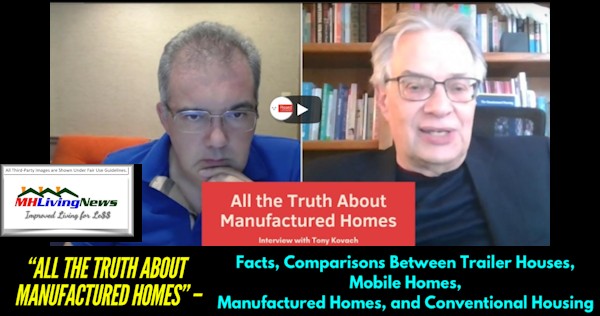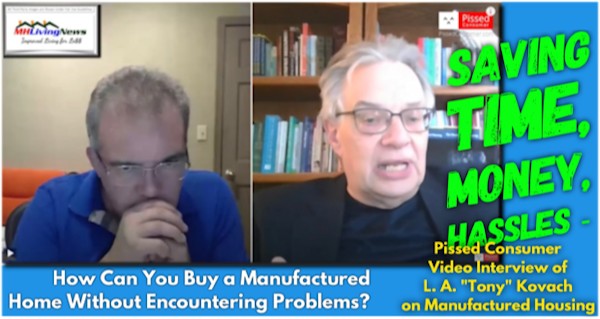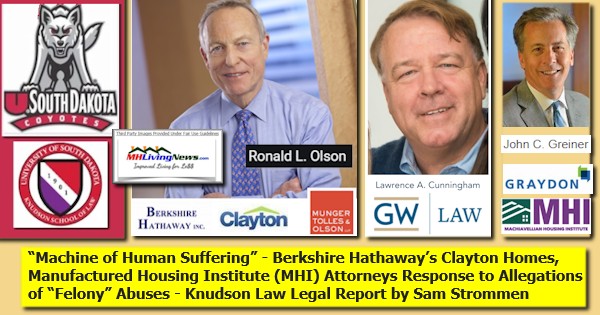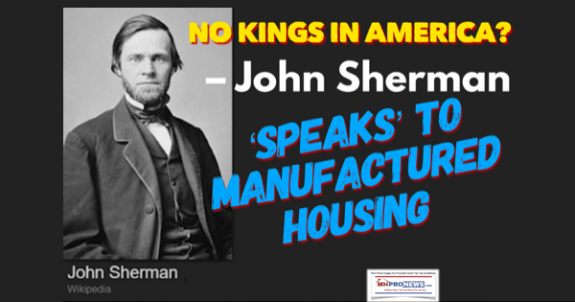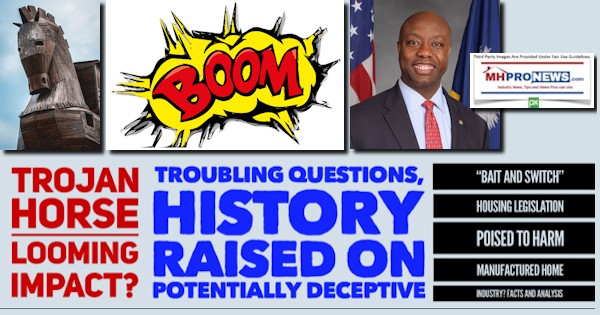
A “discussion draft” of housing legislation being circulated by Senator and 2024 Presidential Candidate Tim Scott (SC-R) is raising serious questions and concerns about its intent and potential impact on manufactured housing regulation and the manufactured home market.
The draft bill, entitled “Renewing Opportunity in the American Dream to Housing Act” (ROAD to Housing Act), was publicly released by Senator Scott, the Ranking Member of the important Senate Banking, Housing and Urban Affairs Committee, on April 25, 2023.
The legislative draft, obtained by MHProNews and which was recently touted by the Manufactured Housing Institute (MHI) in a June 12, 2023 message to members of its Federated States email list and elsewhere, includes two sets of provisions directly affecting manufactured housing.
One set of provisions apparently relate to issues arising out of the Dodd-Frank financial reform law and SAFE Act that have been projected as a perennial thorn in the side – and pet issue — for the Berkshire Hathaway (BRK) and Clayton Homes, Inc.-affiliated lenders, 21st Mortgage Corporation (21st) and Vanderbilt Mortgage and Finance (VMF). Industry newcomers should know, and industry veterans recall the years that MHI attempted to change Dodd-Frank by promoting the Preserving Access to Manufactured Housing Act, with the support of Clayton Homes, 21st, and VMF.
That failed MHI-backed effort to pass Preserving Access created years of drama and was never enacted into federal law as originally proposed.
The other significant provision on the proposed ROAD bill would remove the requirement for a “permanent chassis” that is part of the definition of “manufactured home” contained in both federal manufactured housing law and regulations. The “permanent chassis” requirement has been part of the legislative and regulatory “manufactured housing” definitions since they were first adopted nearly 50 years ago.
While superficially appealing, the potential impacts of these provisions – and particularly the change in the definition of “manufactured home” contained in the industry’s federal regulatory law – could be extremely far-reaching and could include many unintended (or quite possibly intended) negative consequences.
ROAD to Housing Act, Financing and Manufactured Housing
To start with, the finance-related provisions of the discussion draft would require the Consumer Financial Protection Bureau (CFPB) to issue “updated” regulations to: (1) “allow for salaried originators of residential mortgage loans that only originate small dollar mortgages;” and (2) to “amend … limitations with respect to points and fees … to encourage additional lending for small dollar mortgages.” “Small dollar mortgages” are defined in the draft bill (in part) as “mortgage loans having an original principal obligation of not more than $70,000.”
For those who may not recall, CFPB’s loan “originator” prohibition was adopted by the CFPB in response to longstanding complaints from consumer groups that salaried employees of manufactured home retailers were “steering” customers to higher-priced or otherwise disadvantageous loans under the guise of providing loan application assistance. Points and fees meanwhile, are relevant to determining whether a home loan is a “high-cost loan” under Dodd-Frank (and HOEPA), exposing the lender to potential penalties and liability exposure, among other things. Recall reports by the Seattle Times, PBS, and other dramatic pushback which may have focused on Berkshire Hathaway owned brands and MHI but which nevertheless could have easily been misperceived by numbers of consumers as painting all manufactured housing firms as being ‘predatory.’ Is that what the industry – or for that matter, Senator Scott and his supporters – want at this time of a significant and protracted manufactured housing industry downturn?
So, is it pure coincidence that these two-consumer finance-related issues are exactly the ones that were highlighted over and over — and over again — by 21st, VMF and MHI (acting on behalf of the industry’s two dominant consumer financing lenders) in seeking and promoting the Preserving Access legislation to amend Dodd-Frank? And, in fact, a statutory amendment to sidestep the loan originator prohibition was enacted into law in 2018 (S. 2155 having been signed by President Donald J. Trump). But now under this proposed bill by Senator Scott which MHI is clearly backing, these same two provisions (albeit framed as a regulatory amendment and pegged to a no longer market-relevant $70,000 ceiling) mysteriously show up in the Scott bill? Did MHI ask for this without properly advising Scott’s team and Senate Banking Committee members of the past history of this legislation during the Preserving Access era?
What is mysterious – and troublingly odd – is that MHI, while openly and aggressively touting the “permanent chassis” provision of the ROAD to Housing Act (see attached and below), is not known to have said (or published) anything in their emailed ‘news update’ remarks to their own members regarding the financial provisions. Why? Is the permanent chassis provision being used as an appealing subterfuge to cover the financial provisions that if passed would benefit Berkshire Hathaway owned brands? Is there a bait and switch going on, another Trojan Horse type scenario that occurred with the CrossModTM homes fiasco? Or will industry professionals witness one or more of these provisions withdrawn or changed during the legislative process? Or is it something else?
These are just the first of the veritable mountain of questions that need to be raised about the discussion draft with respect to the most fundamental aspects of manufactured housing and its regulation.
In fact, the more closely one looks into the draft bill and the potential impacts of its various provisions, the more one realizes the degree of confusion and potentially serious problems that could follow from its adoption.
Digging Deeper into the Draft for the MHI Backed ROAD to Housing Act
That may especially be the case for the proposed removal of the “permanent chassis” requirement. While such efforts have been mounted from time to time over the years, the U.S. and manufactured housing market is far different that it was 40 years ago (or even 20 years ago).
Back then, there was no such thing as the “tiny homes” movement or the widespread use of recreational vehicles, park models and other types of structures – rightly or wrongly – deployed as permanent residences. As a result, removal of the permanent chassis requirement at that time lead to massive confusion over the lines of demarcation between different types of homes and which jurisdiction or jurisdictions would have regulatory authority over their construction, placement and installation.
The National Association of Home Builders (NAHB) in the past claimed that it opposed the permeant chassis removal, but that was perhaps more a matter of fear over the competitive advantages of HUD Code manufactured housing than any legitimate concern over genuine confusion between manufactured and site-built housing.
But that is not the case today.
Today, powerful forces, such as the International Code Council (ICC) – and others, including some within the HUD Code manufactured housing industry, such as Berkshire Hathaway-owned Clayton Homes, Inc – are openly pushing for the widespread use and recognition of “off-site construction” “off-site structures,” “off-site building,” “off-site built homes” and other variants (referred to as “off-site building” for the balance of this article) as a source of residential housing.
And what does “off-site building” include, according to these sources?
According to the ICC, “off-site” home building was addressed at a June 9, 2023 “Off-Site Construction Summit” in Washington, D.C. That conference included “panelized systems,” “manufactured homes,” “tiny houses,” recreational vehicles, “modular/pods” and “shipping containers,” among other things. Perhaps as or more important, the ICC has developed model codes for the regulation of multiple types of “off-site” building, including modular homes and tiny homes, among others.
The introduction of the term “off-site” into the housing lexicon raises several questions and red flags regarding those apparently MHI backed segments of Senator Scott’s draft bill.
- Why is it seemingly important for the powers that be at MHI to push the “off-site built” term at all? Who in the manufactured home industry actually benefits from it?
- Because traditionally, there have been only two methods of residential single-family dwelling construction in common terminology used in the United States. Namely site built (or stick built) housing and factory-built homes.
- On-site homes include a home built with all raw materials delivered for construction to a job site. Factory-built homes, on the other hand, because of transportation, affordability and other factors are built in a production center or “factory” and then delivered to a site either in whole or in sections.
- Such structures include manufactured homes, modular homes, panelized homes, “prefab” homes, tiny homes and even temporary living structures that include recreational vehicles (RVs) and park models among others (including shipping container conversions).
Now MHI, with apparent Berkshire owned Clayton Homes, ICC and others involved in non-manufactured housing home building are apparently looking to formally codify the term “off-site built homes” and put whatever they want under that term, ranging from manufactured housing to shipping containers and others.
Why? Why has this push in recent years to adopt the term “off-site built homes” moved from a marketing message to now becoming a goal for legislation, which may have outcomes that are potentially harmful for HUD Code manufactured housing?
The proposed removal of the “permanent chassis” requirement could be for good or ill if it is not properly handled.
It could cause massive chaos and confusion, not only within the housing market, but with regard to the lines of authority over the regulation of different types of “off-site built housing” being codified into law.
Put bluntly, the competitors of manufactured housing may hijack such a shift in terminology to the detriment of the HUD Code manufactured home industry. Given MHI’s 21st century track record, is that something that manufactured home industry professionals should just blindly trust MHI and their corporate leadership on?
So, there are several logical questions and concerns that must be raised and addressed before such legislation is properly advanced. To summarize a few, are the following.
- 1) Why the sudden push to move the heretofore marketing or branding term “off site built housing” into legislation? What are the possible risks for doing that for HUD Code manufactured homes?
- 2) Why did MHI not mention the apparent changes in the MHI supported Scott-bill regarding financing that apparently benefit two Berkshire Hathaway owned brands? Namely, 21st and VMF?
- 3) Why is MHI only mentioning in their emails the removal of the “permanent chassis” requirement?
- 4) Further, who stands to benefit from any such chaos and confusion that may flow from regulations that may blur the lines between manufactured homes and other forms of factory home building?
Put differently, given today’s more diversified housing market, what is the potential downside of removal of the permanent chassis requirement for manufactured housing, and is there a bait and switch involved with this fundamental change in the law given the self-interests of all these organizations? Could RVs, park models, certain tiny houses, or other structures benefit at the expense of HUD Code manufactured homes?
To be clear, those other forms of potential short or long-term housing already have their unique status in state or local laws.
At present, manufactured housing is the only segment of the single-family housing market to have its own national building code, which MHI itself has long touted as an advantage. Are MHI leaders prepared to abandon that without a serious public debate of its possible risks to an already struggling manufactured housing market?
Why hasn’t MHI instead pushed for a requirement that HUD’s Office of General Counsel (OGC) to advance the full and proper implementation of the “enhanced preemption” provision of the Manufactured Housing Improvement Act (MHIA) of 2000? After all, MHI and others – including lawmakers – are on record saying they want precisely that outcome.
There are several more questions that ought to be asked and answered by MHI and their corporate masters.
The Future of Manufactured Housing Could Be Changed for Better or Worse by What Happens to this Draft ROAD to Housing Bill
Authentic answers will be extremely important, as they could well determine the entire future of the federally-regulated manufactured housing market. This could be especially true for the manufactured home industry’s most affordable homes, which are currently protected, defended, and advanced by the base or ‘minimum’ standards of the HUD Code for manufactured housing.
What, then, would happen if the term “off-site built homes” were inserted into the HUD regulatory statute during the legislative process triggered by Senator Scott’s bill? Let’s note that Scott’s legislative team is apparently being influenced by MHI. Senator Scott’s team may not realize that there are downsides and apparent favoritism being reflected in this draft legislation.
The industry’s professionals must not forget that Clayton Homes is no longer just a factory home builder. They have several site-built housing companies under their Clayton Properties Group umbrella. Additionally, Berkshire Hathaway has a large real estate brokerage division. These points can’t be overlooked in discerning the motivations for such questionable machinations.
What would happen if a specific proprietary term or any other similarly ill-intended term were included during the legislative process? Or, worse yet, what would happen if any such term or terms were included in HUD’s standards and regulations covering manufactured housing?
Doesn’t this introductory report with analysis reveal the potential chaos and confusion that this MHI backed bill may unleash on an industry that is already underperforming due to lack of enforcement of the MHIA’s enhanced preemption provision, the failure to compel FHFA and FHA Title I loans to be properly modified so that chattel loan support is compelled?
If MHI’s influence in this bill were to simply be trusted, then why is there no apparent evidence of MHI asking Senator Scott’s team to press for existing federal laws to be fully and properly implemented?
Why is MHI ignoring the obvious, while hiding the finance side of this bill behind the long sought removable chassis? And why is MHI pushing for changes that may undermine entry level and other manufactured homes?
Some hypotheticals are warranted.
- What if ICC’s influence in this process causes a change in the standards for manufactured housing?
- Then, what would happen to the most affordable types of mainstream HUD Code manufactured homes which constitute the majority of the HUD Code manufactured housing market?
- Or what would happen if the proponents of confusion between federally-regulated manufactured housing and other types of off-site built structures (many if not all of which compete with HUD Code manufactured housing) were to use the legislative process triggered by the ROAD to Housing Act to push for the end of the HUD manufactured housing program?
- What would happen if those self-interested parties tried to end manufactured housing’s federal preemption and return such regulation to the states? Because one must keep in mind that the legislative process is subject to amendments which both supporters and opponents can introduce.
- What would happen if those self-interested parties tried to tie state regulation over manufactured housing to some dominant role for ICC – either in the development of a model manufactured housing code or some type of continuing enforcement role?
Do some of those ideas appear to be that far-fetched? Stranger things have happened.
For example. Recall that in Texas circa 2001 – HB 1869 – a bill sought by the manufactured home industry, was reportedly changed on the way to enactment. What was once promoted by the MHI affiliated Texas Manufactured Housing Association (TMHA) became a negative, not a positive, for the industry in that state. The TMHA had to work to get that bill ‘fixed’ in the next legislative session (2003). Once again in 2021 a bill was passed in Texas – HB 1869 – that harmed chattel sales and that once again had to be fixed in 2023 (see Texas’ SB521). Per in-state sources in both of those instances, retailers were harmed, some went out of business. One possible takeaway is that what may appear to be good from the perspective of some, can be twisted during the legislative process on the way to becoming law that ends up harmful instead. Texans were fortunate to get those issues fixed. But those remedies did not occur before harm was done, per different TMHA members. While those are state examples, a similar principle applies to legislation at the national level.
While pondering such concerns, it is worth pointing out that NAHB and HUD, which aggressively opposed the removal of the “permanent chassis” requirement from the manufactured housing statute in the 1980s (and since) are somehow strangely quiet publicly concerning the ROAD to Housing Act discussion draft. Again, why is that so? Could it be that one or others are silent partners in this effort to sow chaos and confusion – or worse for manufactured housing?
To underscore that concern, one need not look beyond the research advanced by James A. “Jim” Schmitz Jr. and his colleagues at the Minneapolis Federal Reserve. They have pointed out that HUD and NAHB have long worked against the interests of manufactured housing in Washington, D.C. and beyond.
All of which begs the question – in the highly-charged competitive atmosphere that HUD Code homes and HUD Code manufacturers face with respect to multiple other types of “off-site built homes” – is now the best time to open the fundamental definition of “manufactured home” to a process that would have unexpected twists and turns and equally unexpected but devastating consequences?
History reveals there are major hazards at every turn in such a process.
Self-interested players with untold billions of dollars hanging in the balance may like nothing better than to sabotage competitors and “reinvent” manufactured housing in their own proprietary image. That is the term that Schmitz and his fellow researchers have used, “sabotage.”
Before the manufactured home industry takes the bait, MHI, their staff and their corporate leaders, better offer a public platform that allows ALL segments of the industry to ask and get authentic answer to these and other fundamental and basic questions. That sort of public discussion, beyond the control of MHI and their dominating brands, should include the inclusion of trade media like ours, members of the Manufactured Housing Association for Regulatory Reform (MHARR), and independents who are members of neither (or both) of those national trade groups.
MHProNews will continue to spotlight all of these and other questions, seeking answers and accountability from the major players, and provide further facts and analysis soon. ##
Notice: the graphic below can be expanded to a larger size.
See the instructions below the graphic below or click the image and follow the prompts.
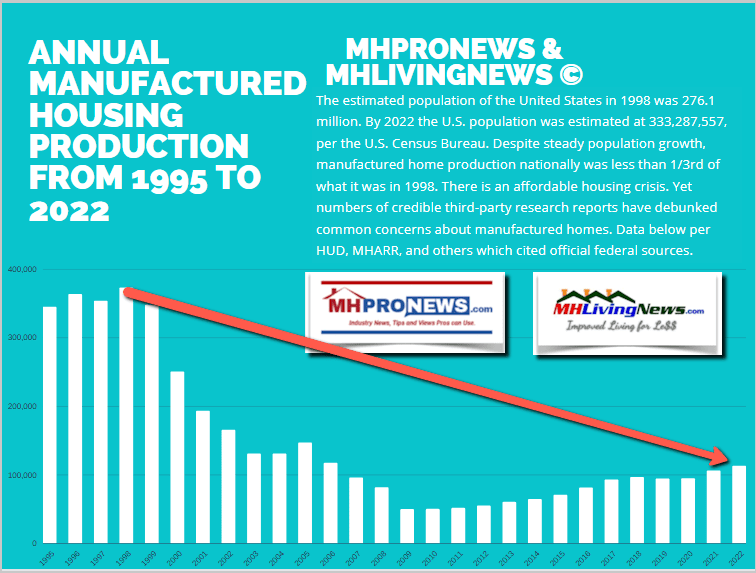
Notice: the graphic below can be expanded to a larger size.
See the instructions below the graphic below or click the image and follow the prompts.

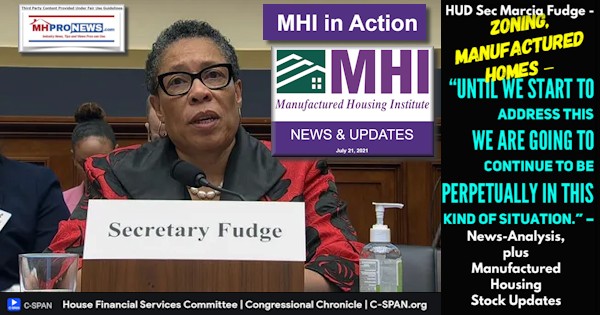
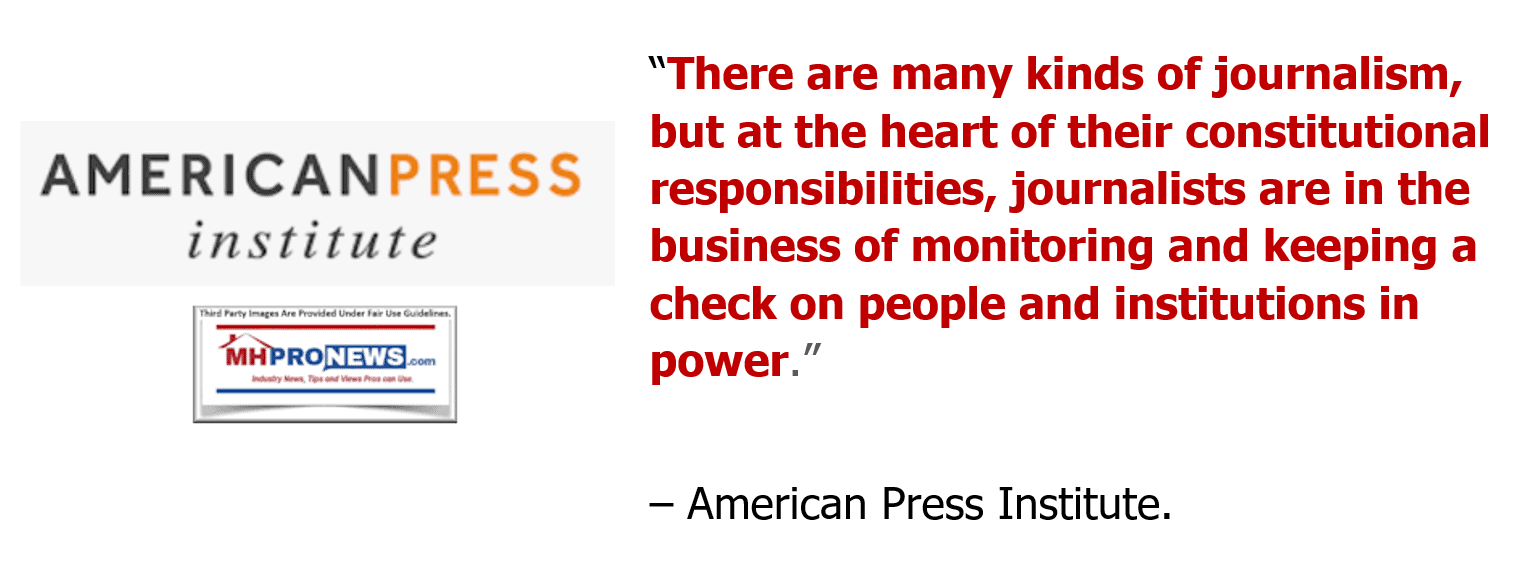


Again, our thanks to free email subscribers and all readers like you, as well as our tipsters/sources, sponsors and God for making and keeping us the runaway number one source for authentic “News through the lens of manufactured homes and factory-built housing” © where “We Provide, You Decide.” © ## (Affordable housing, manufactured homes, reports, fact-checks, analysis, and commentary. Third-party images or content are provided under fair use guidelines for media.) See Related Reports, further below. Text/image boxes often are hot-linked to other reports that can be access by clicking on them.)

By L.A. “Tony” Kovach – for MHProNews.com.
Tony earned a journalism scholarship and earned numerous awards in history and in manufactured housing.
For example, he earned the prestigious Lottinville Award in history from the University of Oklahoma, where he studied history and business management. He’s a managing member and co-founder of LifeStyle Factory Homes, LLC, the parent company to MHProNews, and MHLivingNews.com.
This article reflects the LLC’s and/or the writer’s position and may or may not reflect the views of sponsors or supporters.
Connect on LinkedIn: http://www.linkedin.com/in/latonykovach
Related References:
The text/image boxes below are linked to other reports, which can be accessed by clicking on them.’

